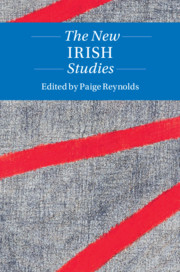Book contents
- The New Irish Studies
- Twenty-First-Century Critical Revisions
- The New Irish Studies
- Copyright page
- Contents
- Notes on Contributors
- Acknowledgments
- Introduction
- Part One Legacies
- Chapter 1 People: Race and Class on the Contemporary Irish Stage
- Chapter 2 Nation: Reconciliation and the Politics of Friendship in Post-Troubles Literature
- Chapter 3 Migration: Migrant Artists Changing the Rules in Post-Celtic Tiger Ireland
- Chapter 4 Language: “World Literature” and Contemporary Irish-Language Writing
- Chapter 5 Land: Neoliberal Wastelands in Contemporary Postapocalyptic Irish Cinema
- Part Two Contemporary Conditions
- Part Three Forms and Practices
- Index
Chapter 2 - Nation: Reconciliation and the Politics of Friendship in Post-Troubles Literature
from Part One - Legacies
Published online by Cambridge University Press: 18 September 2020
- The New Irish Studies
- Twenty-First-Century Critical Revisions
- The New Irish Studies
- Copyright page
- Contents
- Notes on Contributors
- Acknowledgments
- Introduction
- Part One Legacies
- Chapter 1 People: Race and Class on the Contemporary Irish Stage
- Chapter 2 Nation: Reconciliation and the Politics of Friendship in Post-Troubles Literature
- Chapter 3 Migration: Migrant Artists Changing the Rules in Post-Celtic Tiger Ireland
- Chapter 4 Language: “World Literature” and Contemporary Irish-Language Writing
- Chapter 5 Land: Neoliberal Wastelands in Contemporary Postapocalyptic Irish Cinema
- Part Two Contemporary Conditions
- Part Three Forms and Practices
- Index
Summary
This chapter suggests that a discernible trend in post-Troubles Northern Irish fiction and drama is to revisit and revise the “love across the barricades” plot and, in this way, to (re)imagine new forms of political community beyond the communitarian divide. It argues that friendship may offer an alternative model for a political reconciliation than suggested by the peace process and outlined by the 1998 Agreement. Drawing on Andrew Schaap and Hannah Arendt, I propose a distinction between a filiative and an affiliative politics of reconciliation: between one that is predicated on the ideal of a stable community with a common identity and one that foregrounds the establishment of new forms of relationships, presupposing the irreducible plurality of viewpoints as a basis for dialogue about the common world. Focusing on Robert McLiam Wilson’s Eureka Street (1996), Glenn Patterson’s The Rest Just Follows (2014) and Mary O’Donnell’s Where They Lie (2014), this chapter suggests that all three novels consider friendship as a political principle that can give rise to an affiliative reconciliation in invoking a not-yet community beyond ethnonational lines.
Keywords
- Type
- Chapter
- Information
- The New Irish Studies , pp. 47 - 62Publisher: Cambridge University PressPrint publication year: 2020
- 1
- Cited by

